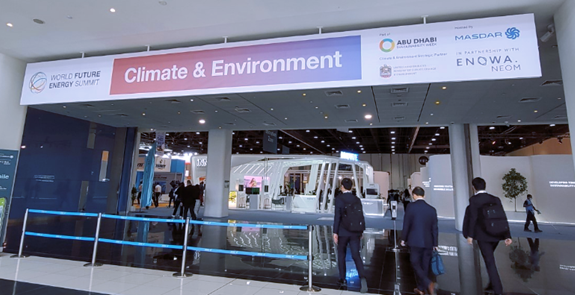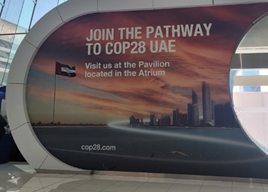The Abu Dhabi Sustainability Week kept the COP27 momentum alive, as we move towards the ambition of COP28
To kick off the new year, government, business, and industry leaders gathered in Abu Dhabi, United Arab Emirates (UAE) this January for the Abu Dhabi Sustainability Week (ADSW) 2023. Hosted by Masdar, ADSW proved to be the largest sustainability-related event since COP27 last November. For the past 15 years, ADSW has served to reinforce UAE’s commitment as a global leader in addressing challenges around climate action, energy transitions, and sustainable economic development. President H.H. Sheikh Mohamad bin Zayed Al Nahyan, along with high-level representatives from across the globe were present during the launch of ADSW 2023.
After attending the Abu Dhabi World Future Energy Summit (WFES), which was part of the ADSW, CCAP aims to capture key decisions and discussions that occurred during the event, while also providing insight into the plans of the UAE government as it prepares to host the upcoming COP28 this November.
The underlying theme for the ADSW event, “United on Climate Action Towards COP28” reaffirms the UAE’s commitment and dedication to hosting COP28 in the latter part of this year. In addition to setting the stage for global dialogue between international leaders, ADSW was vital in sustaining the momentum towards the recent COP27 action built up in Sharm El-Sheikh. Continuing efforts to foster the existing climate and clean energy initiatives will be essential for meeting global climate goals in a more effective manner this year.
Key Highlights of the ADSW 2023:
UAE President announces 2023 as “Year of Sustainability” - Following the conclusion of ADSW 2023, President H.H. Sheikh Mohamad bin Zayed Al Nahyan declared 2023 to be the year of sustainability, indicating further anticipation of several initiatives, activities, and events to be held by the country. The announcement is also intended to showcase the leading role of the UAE in spearheading innovative solutions to address global issues related to climate change, energy, and overall sustainability.
The Abu Dhabi Sustainable Finance Forum (ABSFF) - As part of the ADSW 2023 agenda, the Abu Dhabi Global Market (ADGM) held the ABSFF to strategize priorities and begin preparations for this year’s climate change conference in Dubai. “The forum focused on “Chartering the Path to COP28” by convening with stakeholders on various themes including nature-based carbon credits, concrete sustainable finance transactions, and products along with additional mechanisms for mobilizing sustainable finance through SMEs, accelerators, and platforms within ADGM.”
Masdar Clean Energy Projects in Africa – Under the recently established “Etihad 7" program that launched during ADSW 2022, the UAE aims to secure and allocate funding for renewable projects in Africa. The Etihad 7 program seeks to deliver clean electricity to 100 million people by 2035 and will solicit funding from both the public and private sectors. To build on that momentum, UAE’s clean energy giant, Masdar, closed deals for renewable energy projects that will scale up a combined generation capacity of 5GW across three different countries: Angola, Uganda, and Zambia.
The First Edition of the Green Hydrogen Summit – The Green Hydrogen Summit, hosted by Masdar Green Hydrogen, had also been featured during ADSW 2023. In the first edition of the Green Hydrogen Summit, Abu Dhabi showcased the nation’s achievements and willingness to create a global hub geared towards green hydrogen technology and investments. The Summit identified key trends and ongoing developments in the sector, stating that it will drive conversations and dialogue around developing a hydrogen economy. Further developments will consist of a Hydrogen Hub, a quarterly web series, an annual survey, and occasional white papers.
Abu Dhabi World Future Energy Summit (WFES):
Abu Dhabi World Future Energy Summit (WFES) was held from January 16-18 in Abu Dhabi National Exhibition Centre (ADNEC). The summit included six thematic forums: Solar & Clean Energy, EcoWaste, Water, Smart Cities, Climate & Environment, and Industry. Over the course of three days, the summit showcased the latest innovative clean technologies across all sectors by companies and entrepreneurs in the exhibition halls. Additionally, participants could learn regional and technological trends from expert presentations and panel discussions. UAE government officials, business leaders, and investors discussed high-level strategies and action plans towards achieving a net zero future by 2050 and the path forward to facilitate the public and private partnership while overcoming existing policy and institutional obstacles.
A Sneak Peek into COP28 Topics and Agenda Items:
The UAE, the first country that committed to emissions reductions as part of its Nationally Determined Contribution (NDC), along with the ratification of the Paris Agreement in the region, will host the 28th Conference of the Parties (COP28) to the United Nations Framework Convention on Climate Change (UNFCCC). COP28 will be held at Expo City in Dubai, from November 30 – December 12. As the first step in the preparatory stage, Sheikh Mansour bin Zayed Al Nahyan, the Deputy Prime Minister and the Minister of the Presidential Court of the UAE appointed Dr. Sultan Ahmed Al Jaber, the Chief Executive of Abu Dhabi National Oil Company (ADNOC) as President-Designate for COP28. In addition, it was announced that the Special Envoy for Climate Change of COP28, high-level planning and decisions, and registration information will be available on a newly launched COP28 webpage.
The UAE and its stakeholders remain steadfast in their collective efforts to uphold activities in line with the UAE Net Zero 2050 mandate. This strategic initiative calls on nations to prepare long-term strategies to reduce greenhouse gas (GHG) emissions and limit the rise in global temperature to 1.5 Celsius compared to pre-industrial levels, aligning itself with the goals outlined in the Paris Agreement.
In a large-scale announcement to raise ambition towards the mandate, the country recently released the UAE Hydrogen Leadership Roadmap in 2021, which serves as a national blueprint for bolstering low-carbon industries as well as establishing the UAE as a lead exporter of hydrogen.
In line with the government’s initiative, sectoral ministries and corporations are expected to update and align their plans and strategies to reflect new methodologies, targets, and KPIs. It is expected that the Ministry of Climate Change and Environment (MOCCAE) among others, will play a key role in coordinating and monitoring these activities to further stimulate comprehensive dialogue for successful collaboration.
Private sector involvement and leadership activities
It was remarkable to see the active engagement and achievements of the private sector in the region. Amazon, the world’s largest corporate purchaser of renewable energy, shared its climate goal to fully operate with renewable energy across the entire business by 2025. Jake Oster, Director of Energy and Environment Policy, EMEA at Amazon Web Services (AWS) shared the footprints and impacts of utility-scale solar and wind projects in the USA and Europe. The 2.7 MW installation-based first rooftop solar project in UAE, which generates on-site solar energy, was also showcased in his presentation.
Inclusive climate action
“Inclusiveness” was among the themes highlighted across many of the experts’ conversations. Several leaders and experts emphasized the need for accelerating inclusive climate actions as well as the importance of Youth Voices – This topic was also historically featured as one of the agenda items during COP27 in Egypt. This focus was aligned with an additional objective of ADSW 2023, which fostered youth participation and engagement under Masdar’s Youth4Sustainability (Y4S) platform. The Y4S Platform is designed to enable 3,000 young leaders to bring forth innovative ideas to aid in the transition towards sustainable development. The UAE Youth Climate Delegates Program has already been initiated under the Climate Special Envoy of the country.
The climate solutions that consider Gender & Women were also embraced during the event. In efforts to further advance mainstreaming the topic of gender in this context, the annual forum for Masdar’s Women in Sustainability, Environment and Renewable Energy (WiSER) took place during ADSW, empowering women to raise their concerns and deliver ideas to the debates on sustainability.
Ongoing efforts to accelerate climate finance and investment flows
Climate finance is expected to be one of the critical topics at COP28. Dr. Mohieldin, UN High-Level Champion and UN Special Envoy for Financing the 2030 agenda stated:
“Mobilization of climate finance needs to be at the local, regional and global levels. Last year, we released an extended compendium comprising 128 projects in need of USD 128 billion. This provides the basis for a project pipeline, with projects across mitigation and adaptation, rooted in NDCs and regional priorities.”
During ADSW, the creation of an Expert Group of the UAE-USA bilateral Partnership for Accelerating Clean Energy (PACE) that will oversee the planning and implementation of investments was announced. The Deputy Co-Chairs of the Expert Group are Majid Al Suwaidi, Director General of COP28 and David Livingston, Senior Advisor to the U.S. Special Presidential Envoy for Climate. The officials from two countries also announced the $20 billion fund allocation using both equity and debt financing under PACE to support clean and renewable energy projects in the US by 2035. The partnership plans to catalyze $100 billion in financing and investment to promote the deployment of 100 gigawatts of clean energy by 2035.
Although financial flows towards clean technologies have been growing, challenges still remain. Experts shared the role of governments’ intervention in improving visibility of revenue streams of the private sector. In addition to setting the long-term mandate, an elaborated subsidy structure and tax reforms – for both climate-positive and negative activities – would allow private corporations and investors to shift their investment strategies and portfolios. Furthermore, recognizing the importance of transparent reporting of climate-related risks and emissions, experts from the industry and financial sector shared their approaches and processes for reporting.
Experts agreed that more guidance on how to comply with governments’ regulatory framework as well as stronger signals relating to the benefit of compliance regulations—such as ESG reporting for businesses—is considered indispensable. In this vein, it is vital to reinforce communication channels between governments and the private sector, while also raising awareness of relevant stakeholders.
When it comes to investing in clean technologies and businesses, the investment should consider not only the costs of capital and O&M, but also the investment in human capital development. This is due to new capabilities and expertise that are required when shifting from carbon-intensive industries in the process of decarbonization. In this way, a smoother and more affordable transition can be achieved.

CCAP’s mission is to support every step of climate action, from ambition to implementation. A recognized world leader in climate policy and action, CCAP creates innovative, replicable climate solutions, strengthens capacities, and promotes best practices across the local, national, and international levels to accelerate the transition to a net-zero, climate-resilient future. CCAP was founded in 1985 and is based in Washington, DC.







Comments